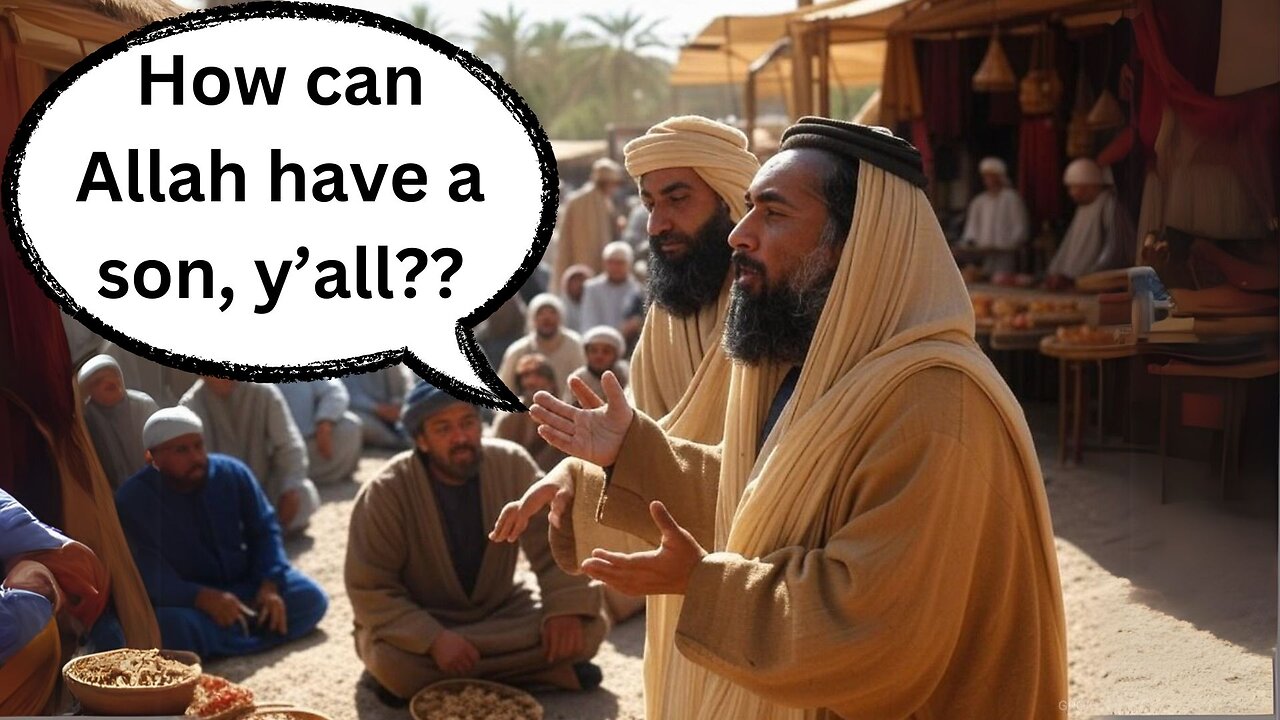Premium Only Content

The Quran’s Plot Hole: Can Allah Have a Son?
Today’s Topic: How Allah’s “Son” Was a Plot Hole About Jesus
The Quranic verse often translated as “How can Allah have a son when He has no companion?” contains a fascinating hidden truth. The phrase, when properly translated as “How can He have a son when He didn’t have a companion?” reveals it’s actually referencing Jesus. Starting with “Originator of the heavens and the earth,” this verse would have resonated with Judeo-Nazareen Christians, who understood it as a call to Jesus. We’ll explore why the celibacy of Jesus, not Allah’s omnipotence, is the real focus of this passage, and how mistranslations have obscured its meaning for centuries.
About the Series
This series offers an in-depth reexamination of the Quran and Islamic history, challenging traditional narratives and unveiling the hidden layers of Islam's origins. In recent decades, researchers and scholars have made groundbreaking progress in understanding the Quran’s Aramaic roots, shedding light on the ways its original context may have been altered or misunderstood. They have also highlighted glaring discrepancies, such as how the descriptions of Mecca in early Islamic texts fail to align with historical and geographical reality. Astonishingly, Mecca is absent from ancient records, and no archaeological evidence supports its existence as a thriving city during Islam's formative years.
Furthermore, evidence suggests that the early history of Islam was largely fabricated, with the figure of Muhammad being a composite of multiple characters, including Umar, Ali, and Salman al-Farisi. Scholars and researchers have reexamined Quranic verses and surahs, revealing shocking reinterpretations. For instance, Surah 17:1, traditionally interpreted as the Prophet's Night Journey, is now understood as a story about Moses. Surah 97, long thought to describe the Night of Power, appears to be a Christian hymn celebrating the birth of Jesus. These insights reveal how narratives were altered to suit evolving theological agendas, such as renaming Bani Israil to Al-Isra to sustain the Islamic narrative.
The study of the Qira'at (variant readings) has further complicated the traditional understanding of the Quran. These readings, meticulously compiled by scholars like Shady Nasser, expose stark differences in wording and meaning across texts. Many of these variations, which contradict one another, have been hidden from Muslim audiences to maintain a façade of uniformity. Additionally, research on early Quranic manuscripts by scholars like Daniel Brubaker reveals edits, omissions, and censorship in key verses, highlighting a history of textual manipulation.
With the rise of literacy and access to the internet, these findings have reached audiences worldwide, leading to unprecedented levels of skepticism and apostasy within the Islamic world. Countries with greater literacy rates are witnessing a growing awareness of these historical discrepancies, fueled by digital platforms that democratize access to knowledge.
Our series also incorporates the literal translations by Saint Murad, which uncover significant mistranslations in standard versions of the Quran. For instance, past-tense Arabic sentences have been deliberately mistranslated into the present tense to suggest that Muhammad was referring to himself, when in fact the text may describe figures or events from the distant past.
Through this series, we aim to provide a comprehensive overview of these groundbreaking discoveries, offering viewers an opportunity to rethink Islamic history and the Quran itself. This is a journey into the depths of history, language, and theology, designed to encourage critical thinking and foster a deeper understanding of one of the world’s most influential texts.
-
 44:57
44:57
Standpoint with Gabe Groisman
1 day agoWill Byron Donalds Run for Florida Governor? With Congressman Byron Donalds
25.6K6 -
 1:06:25
1:06:25
Savanah Hernandez
3 hours agoEXPOSED: FBI destroys evidence as NSA’s LGBTQ sex chats get leaked?!
42.1K14 -
 1:59:58
1:59:58
Revenge of the Cis
4 hours agoEpisode 1452: Hindsight
37.5K3 -
 1:20:35
1:20:35
Awaken With JP
6 hours agoCrenshaw Threatens to Kill Tucker and Other Wild Happenings - LIES Ep 80
92.4K63 -
 1:32:19
1:32:19
Russell Brand
5 hours agoBREAK BREAD EP. 15 - LECRAE
105K10 -
 1:37:26
1:37:26
The Officer Tatum
6 hours agoLIVE Rachel Maddow, Don Lemon MELTDOWN Over Joy Reid's FIRING! + More Ep 68
68K31 -
 1:11:24
1:11:24
The Gateway Pundit
4 hours agoEpstein & JFK Files BLOCKED: Luna’s SHOCKING Clash with Pam Bondi! | Elijah Schaffer & Jim Hoft
119K41 -
 1:12:42
1:12:42
John Crump Live
8 hours ago $0.45 earnedFake Gun Advocates.
9.06K1 -
![[Ep 616] Colony Ridge History & Raids | Guest: Elsa Kurt | Crenshaw Unhinged – Wants to Kill Tucker](https://1a-1791.com/video/fwe1/4d/s8/1/K/3/M/j/K3Mjy.0kob-small-Ep-616-Colony-Ridge-History.jpg) 2:00:45
2:00:45
The Nunn Report - w/ Dan Nunn
4 hours ago[Ep 616] Colony Ridge History & Raids | Guest: Elsa Kurt | Crenshaw Unhinged – Wants to Kill Tucker
24.2K10 -
 2:03:21
2:03:21
The Quartering
7 hours agoDan Crenshaw Hot Mic Threat, Jake Paul Endorses Vivek, and Kathleen Kennedy Leaves Lucasfilm
76.3K29